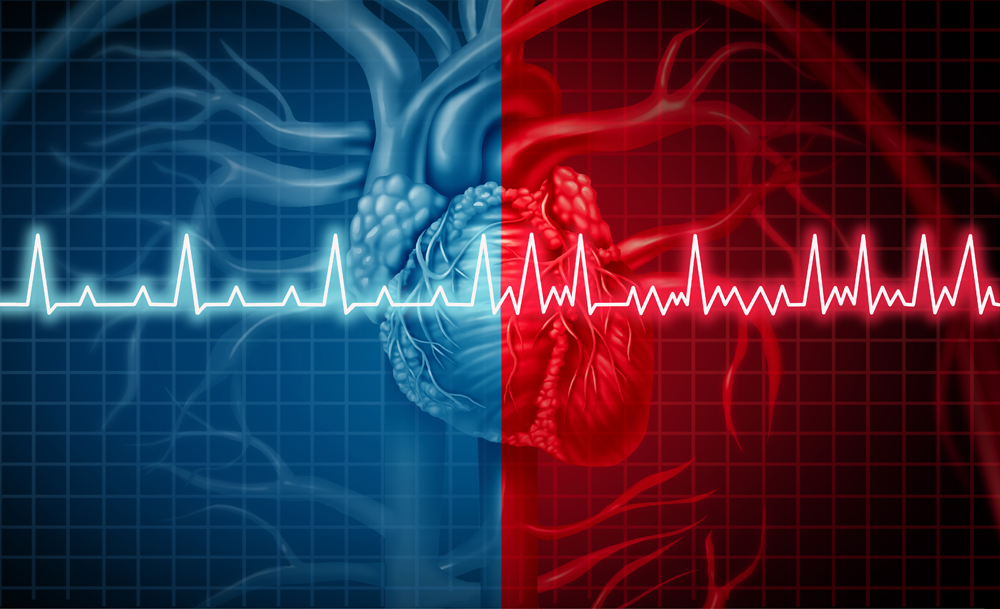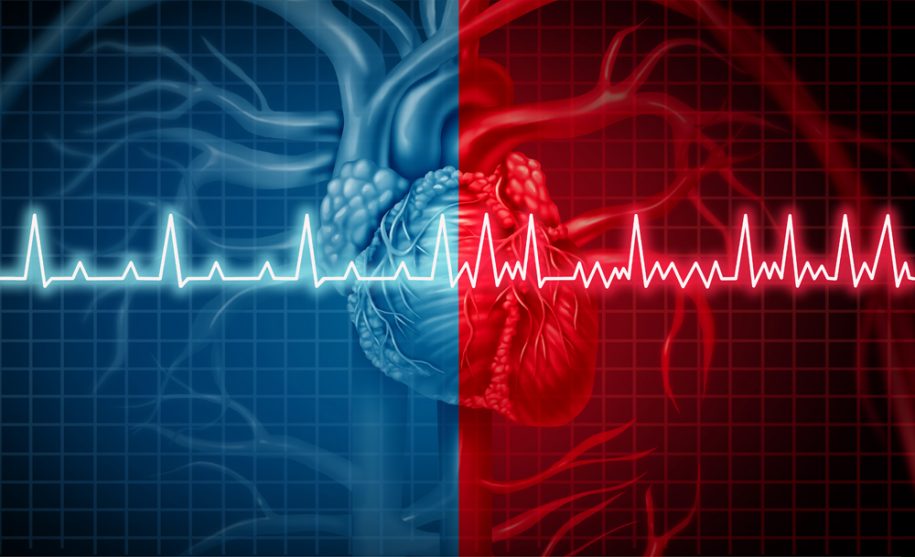Certain foods and nutritional choices are especially useful in helping you control AFib, prevent symptoms, and minimize complications.

Follow these guidelines when deciding how to eat to manage atrial fibrillation (AFib):
- For breakfast, choose whole, high-fiber foods like fruits, pseudograins (buckwheat, chia, flax, quinoa, nuts, seeds, and vegetables. An example of a healthy breakfast would be creamy peaches and buckwheat cereal—I added almonds and raisins. Eggs with potato’s sauteed in butter are also a good option.
- Watch your salt and sodium intake. If you are cooking for yourself from whole foods, you aren’t likely to exceed the recommended daily allowance of 1500-2000mg. Do make sure to use sea salt and not iodized. Iodine can trigger aFib.
- Aim for 50 percent produce at each meal to help nourish the body and provide fiber and satiety.
- Keep your portions small. Try weighing your food on a food scale to ensure your portions are not too big.
- Skip foods that are fried or covered in sugar.
- Try not to have too much caffeine or alcohol each day. Studies show that limited amounts of caffeine or alcohol do not result in AFib; however, this is very individualized.
- Be mindful of your intake of essential minerals, such as magnesium and potassium.
- Some professionals limit red meat and dairy. Dairy and meat from commercial, grain-fed, animals are very high in bacteria and unhealthy fats. Studies show this leads to unhealth in people who consume animal products where the animals are fed grains and commercial feed. Inflammation and inflammatory foods can trigger aFib. Try to obtain pasture-raised meats, eggs… wild caught fish… If you follow this link and use discount code SN2020 you get a 10% discount.
Nutrients to emphasize to minimize AFib:
Vitamin K
Vitamin K is present in these foods:
- leafy green vegetables, such as spinach and kale
- blueberries
- broccoli
- calf’s liver (pastured not grain fed or finished)
- cauliflower
- green tea
- okra
- parsley
- pumpkins
The amount of vitamin K you should consume daily varies based on your age:
- Adolescents between 14 and 18 years of age can have about 75 micrograms (mcg) per day.
- Most males over 19 years of age can have about 120 mcg per day.
- Most females over 19 years of age shouldn’t have much more than 90 mcg per day, even if they’re pregnant or nursing.
First discovered as a clotting factor, Vitamin K has many functions throughout the body including bone strength and remodeling. Warfarin (Coumadin) blocks vitamin K, impairs bone mineralization and increases risk for fractures. There is some evidence that aspirin may as well. Individuals who take anticoagulants should maintain consistent intake of vitamin K, especially if taking supplements. Ask your doctor about switching to a non-vitamin K acting oral anticoagulant such as Dabigatran (Pradaxa), rivaroxaban (Xarelto), and apixaban (Eliquis) or whether it makes sense to switch to natural anticoagulants such as hawthorn, ginseng, chamomile, garlic or others.
Vitamin K is also
Magnesium
Some research shows that low magnesium in your body can result in irregular heart rhythms. It’s easy to get extra magnesium in your diet by eating some of the following foods:
- avocados
- broccoli
- nuts, especially almonds, cashews, peanuts, Brazil nuts and/or their butters
- beans, especially black, navy, pinto, lima beans, green beans
- seeds, especially buckwheat, sesame, pumpkin, sunflower
- quinoa
- spinach
- tomatoes
Potassium
On the flip side of excess sodium is the risk of low potassium. Important for cardiac health, potassium allows muscles to work efficiently and relaxes blood vessels. Low potassium levels may increase your risk of arrhythmia.
Imbalanced diets and certain diuretics (including the most-commonly prescribed Thiazide) can cause potassium imbalances. You can discuss potassium-sparing diuretics you’re your doctor such as amiloride, triamterene (Dyrenium), spironolactone (Aldactone), eplerenone (Inspra).
Some good sources of potassium include:
- fruits, especially avocados, apricots, peaches, lemons, papaya, cantaloupe
- beans, especially black, pinto, kidney, lima beans
- bok choy
- Brussels sprouts
- all leafy greens
- prunes
- root vegetables, such as sweet potatoes, yellow/red/purple potatoes, beets
- tomatoes
Omega-3 fats
While 3-5 grams daily of omega-3 fats (dietary from wild-caught fish, pastured animals, etc., and/or supplemented as needed) can reduce blood pressure and is a routine nutritional and medical strategy for doing so, there is conflicting evidence that fish or omega-3 supplements can improve AFib. However, omega-3 fats and supplements are extremely safe as long as they are from reputable companies that test for high levels of mercury, PCBs, and other contaminants.
B Vitamins
Your heart beats 24/7 and needs a substantial amount of energy to do so. Part and parcel to creating energy are B vitamins, especially B1 (Thiamine), B3 (Niacin), B6 (Pyridoxine), B9 (bioavailable folate), and B12 (bioavailable cobalamin). Never, ever, please, take a synthetic B complex. These are not readily bioavailable and your situation—especially if you experience AFib—may be quite different.
Foods high in B- vitamins include seeds (especially sunflower seeds), beans of all kinds, wild caught seafood (especially halibut, salmon, sardines, shrimp, cod), pastured animals and their eggs, wild caught animals, sweet potatoes, spinach, nutritional yeast.
Grapefruit
Studies show that a powerful chemical in grapefruit called naringenin has many antimicrobial properties including against Helicobacter pylori, Hepatitis B, Hepatitis C (another study here). A few clinical trials exist that show naringenin (also found in tomatoes) can improve liver function, help reverse liver disease, and improve endothelial (blood vessel) function.
On medications? Eating grapefruit and especially its juice can decrease how quickly your liver transforms and eliminates medications. Naringenin slows an enzyme in the liver used to modify toxic chemicals in the process of elimination.
Ingredients to use cautiously or avoid as these may trigger AFib
Gluten
Gluten and gluten-like proteins are found in wheat, rye, barley, oats, rice, corn and millet. These are common ingredients in breads, pastas, deserts, packaged foods and used as thickeners in most commercial condiments and salad dressings and packaged foods.
As corn, rice, and oats have a “gluten-like” protein, technically they can be labelled “gluten free”. However, these grass family seeds are all seen as gluten by the body as the irritating portion of the protein is identical although other regions may have changed (thus no longer being called gluten).
Consuming grass family grains causes inflammation in your body, especially your gut. Gut and other organ inflammation sends a signal to your brain via the vagus nerve. Although we often don’t feel pain in our gut, telltale symptoms include brain fog, bloating, gas, sometimes reflux, irregular bowel movements… Because your body is mounting a stress response to these foods, the AFib can act up too.
Tyramine Foods
Tyramine is an amino acid in aged and cured meats and cheeses, wine, dark chocolate, and other foods. Tyramine exerts its action on the heart through the nervous system. While not a trigger for everyone, tyramine has been documented as the culprit in some AFib (and migraine) cases. I recommend a tyramine elimination diet for at least one month if you want to assess your sensitivity to it. When you reintroduce tyramine after one month, if it triggers AFib, then continue to avoid those foods to protect your heart function.
Coffee
A common beverage for practitioners to include on their limit/eliminate list, black coffee may not be the fiend once thought. Sugar and dairy added to coffee may be a problem. A review of studies shows that 1-3 cups of coffee daily do not produce AFib in most men prone to AFib. Sorry ladies, they didn’t get to that, yet.
The takeaway
A healthy diet can help with many underlying health conditions, including high blood pressure, high cholesterol, obesity, skin issues, digestive issues, more…
Avoiding or limiting certain foods and taking care of your health can help you lead an active life and reduce your risk of AFib episodes.
Be sure to talk with your nutritionist and/or doctor about medication and food interactions. Do know that it is common to have an irregular heartbeat and shifting your diet may resolve it.
There is hope and I can help. Call me 907-222-1824.
Copyright © 2002 Marie Cecchini Sternquist dba Synergy Health and Nutrition, LLC. All rights Reserved


Leave a Reply
You must be logged in to post a comment.